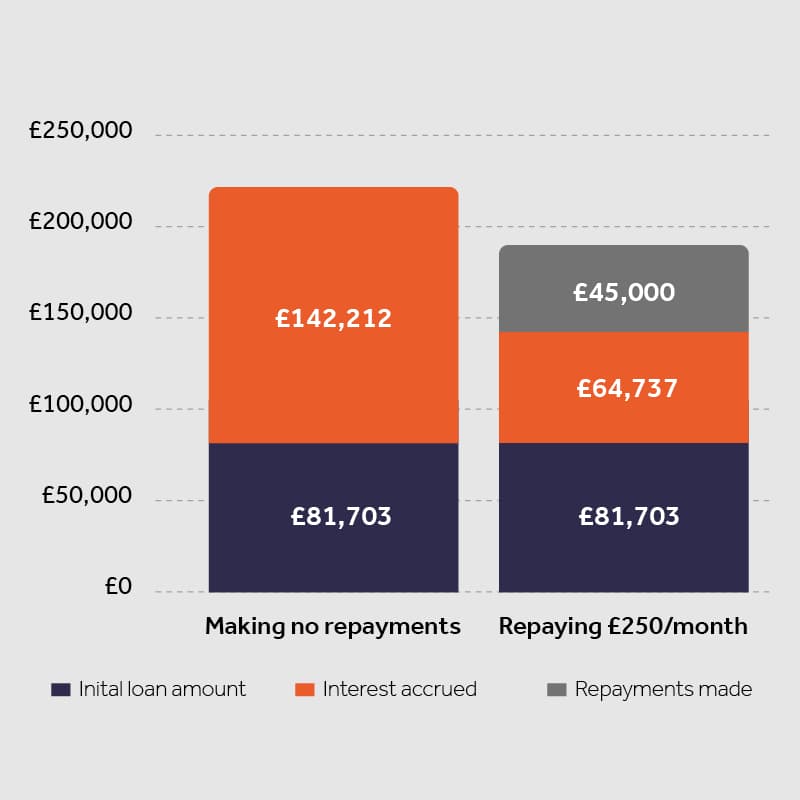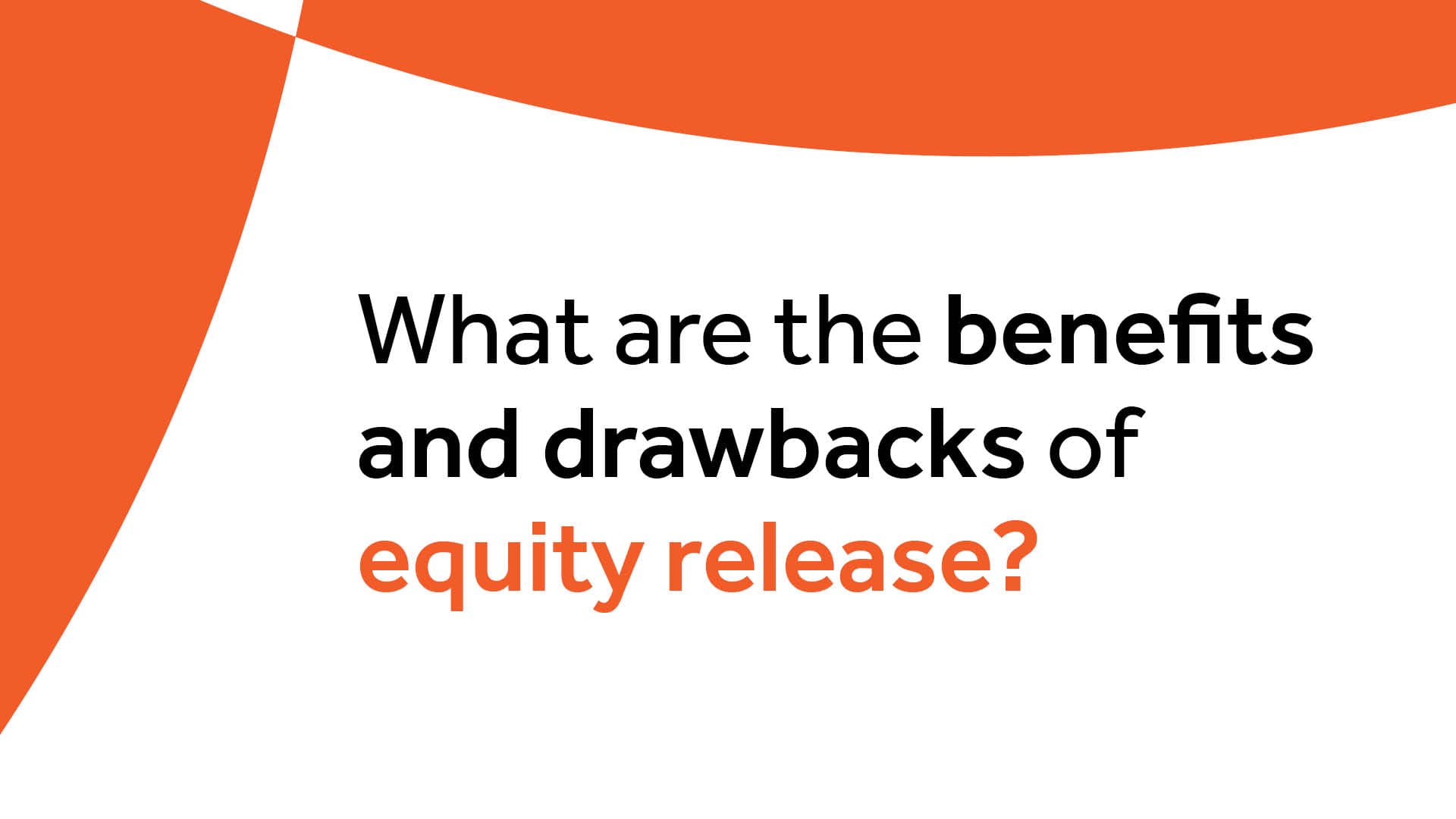We use some essential cookies to make our website work properly.
We’d also like to set additional cookies to help us improve our website, tailor marketing and provide a more personal experience.
Unless you choose to do so, there are no repayments to make on a lifetime mortgage until the plan comes to an end. As a result, you pay interest not only on the loan itself, but also on the interest that’s already been added to the loan. But there are ways you could reduce the total cost of borrowing of your lifetime mortgage which we outline in this guide.
Whether interest is added to your lifetime mortgage on a monthly or annual basis is dependent on your plan. But during that first period, the interest is charged and added to the original loan amount - the sum of tax-free cash you unlock from your home’s value.
ⓘ Illustrative example
Illustrative purposes only. It uses the average release amount of £82,475 and monthly equivalent rate (MER) of 6.3% – Key Market Monitor H1, 2023. Average UK house price of £288,000 – ONS, August 2023.
| Year | Balance at start of year | Interest (6.3% MER)¹ | Balance at end of year² | Remaining property equity³ |
|---|---|---|---|---|
| 1 | £82,475 | £5,349 | £87,824 | £200,176 |
| 2 | £87,824 | £5,695 | £93,519 | £194,481 |
| 3 | £93,519 | £6,065 | £99,584 | £188,416 |
| 15 | £198,778 | £12,891 | £211,669 | £76,331 |
| 20 | £272,153 | £17,649 | £289,802* | £0 |
* The end of year balance is higher than the property's value. You'll never owe more than your home's worth, though, with a lifetime mortgage we recommend. This is the no negative equity guarantee.
¹ The rate at which interest adds to the loan – in this case, monthly (MER). All lifetime mortgages we recommend have a fixed interest rate for life. This column shows how much interest has added to the loan that year.
² How much is owed at the end of the year, including compound interest.
³ The difference between your property value and your outstanding lifetime mortgage balance.
All lifetime mortgages we recommend come with features which could help to reduce the total cost of the borrowing if that’s important to you; for instance, if you wish to leave a larger inheritance to your loved ones.
Even though there are typically no monthly repayments to make with a lifetime mortgage, all plans we recommend come with the option to make ad-hoc or regular repayments to help reduce your total cost of borrowing.
Even if you’re only able to make small repayments, it will help reduce the amount of interest you pay over the lifetime of your loan.
ⓘ Illustrative example
In this example, if you were to borrow £81,703, with a fixed 6.74% MER interest rate, and make no repayments at all, after 15 years, your total cost of borrowing would be £223,915. However, by making a monthly £250 repayment, after 15 years, you’d owe £146,440 - with a total cost of borrowing, including repayments, of £191,440. This means, by repaying £250 a month, you, and your beneficiaries, could benefit from a £32,475 net interest saving.

If interest rates reduce in the future, you may have the option to remortgage your current plan to secure a lower rate.
With a drawdown lifetime mortgage, you only take out the money you need when you need it. This can help reduce your total cost of borrowing, as interest is only charged on the money you release, rather than the full amount available. It's worth noting that a drawdown facility is not guaranteed as the lender has the right to withdraw it.
More on lump sum vs drawdown lifetime mortgage
As you only pay interest on the funds you release, you could potentially save thousands over the course of your plan with a drawdown lifetime mortgage. Here's an example to help you understand how this could work for you.
ⓘ Illustrative example
This example is for illustrative purposes only and shows there are two customers who both have access to a lifetime mortgage facility of £81,703 at an interest rate of 6.74% (future drawdowns will be charged at the prevailing interest rate) - Key Market Monitor Q1, 2023.

Customer B saves £32,851 in interest charges
While Customer B still borrows the same £81,703 over 15 years, because they take their money in stages, their total cost of borrowing is lower as interest is only charged when they release their funds. As a result, Customer B saves almost £32,851 in interest charges over the total life of their plan. This example is over 15 years but it could be longer or shorter.

Watch our video to learn more about the benefits and drawbacks of equity release and see if it could be right for you.
All our equity release advice relates to lifetime mortgages - a loan secured against your home.
Video transcript (pdf)
If you're thinking about releasing equity from your home, it's important to find out if you could be eligible.
You can check this by using our free online calculator.
To take out a lifetime mortgage through Key, you must be a UK homeowner:
It's a regulatory requirement for anyone considering equity release to get specialist advice before taking out a lifetime mortgage. So why should you choose Key as your equity release company?
ⓘ Did you know...
Over the years, more than a million customers have benefitted from our expert advice, experience and professionalism from Key. We've been rated 'Excellent' on Trustpilot and you can check out the great things our customers have to say about the equity release plans we recommend.

69, Retired
“I sat down with the adviser and he went through every single detail and concerns, plus a lot more which I didn’t know about. They took care of everything… it’s so uncomplicated… the process is so easy.”
Read more on John's experienceYour other options with Key
If another product is more suitable, we'll refer you to a different specialist adviser within Key Group who can help. If you go ahead, you'll never be charged more than our standard fixed advice fee of £1,699, even if their fee is higher. Key offers alternatives to equity release such as a retirement interest-only mortgage or retirement repayment mortgage.
Other options to think about
It's important to know your other options before going ahead with equity release. These include: downsizing, unsecured lending, using existing assets, or support from friends or family.
When it comes to releasing equity from your home, we understand that you may have questions too. To help, we have compiled the answers to the questions we get asked the most. If you are still unable to find the information you're after, we are just a phone call away.
If you’re looking for ways to release funds from your home, you may be wondering “is equity release the same as a lifetime mortgage?” A lifetime mortgage is one of two types of equity release, allowing you to free up tax-free funds in later life.
The other type of equity release is a home reversion plan. This involves selling all or part of your home to a provider in exchange for a lump sum. We recommend lifetime mortgages only, allowing you to keep full ownership of your home.
A key benefit of lifetime mortgages we recommend is that you retain full ownership and can continue living there for as long as you like.
A lifetime mortgage is a loan secured against your home. Usually, when you or the last remaining applicant pass away or move into long-term care, your home will be sold to repay the loan. Any remaining funds from the sale will be passed on to you or your estate.
We're proud members of the Equity Release Council and recommend lifetime mortgages that meet their standards, including the No Negative Equity Guarantee. This is an important protection which ensures you'll never owe more than the value of your home when your plan comes to an end.
This means there's no risk that you'll pass on debt accrued through equity release to your loved ones. In the unlikely event that your home decreases in value enough to leave a shortfall between the sale proceeds and the amount you owe, the no negative equity guarantee writes off the remainder of your loan.If you currently receive or are eligible to claim means-tested benefits, taking out a lifetime mortgage may affect your eligibility as it will change your financial situation. Our advisers can review your current position and discuss your options moving forward including how a lifetime mortgage may affect any benefits you receive.
You may wish to repay some of your lifetime mortgage early and reduce the size of the loan you accrue interest on. Subject to criteria, we may be able to help you personalise your plan with the option of making ad-hoc repayments of up to 10%-12% of the initial amount you've borrowed each year.
Additional repayments, including repaying in full, may incur early repayment charges. Your adviser will explain these terms clearly so you know what your options are.Equity release isn't something you should rush into. Read our RetireWise articles to learn more about how it works and whether it's right for you.